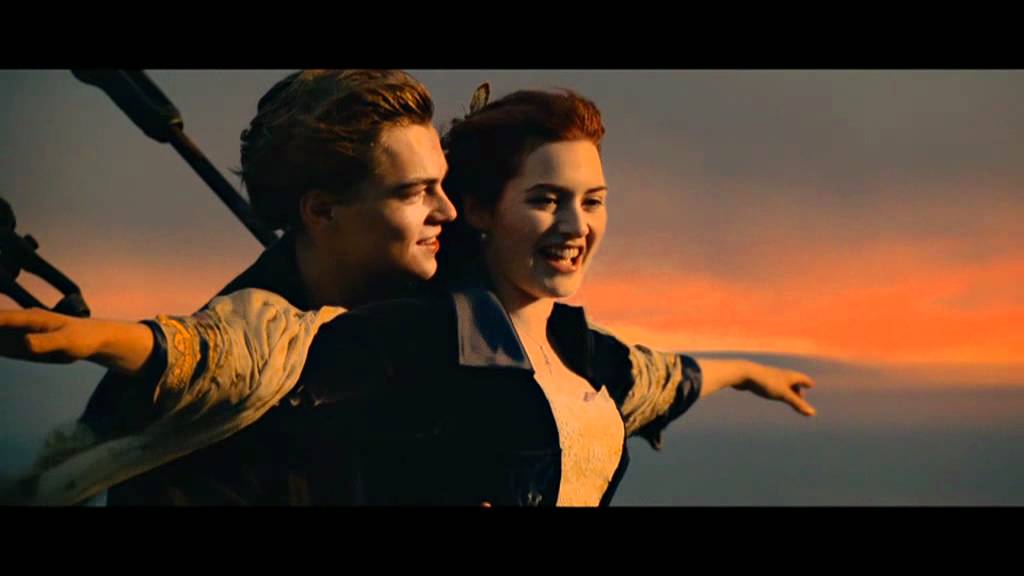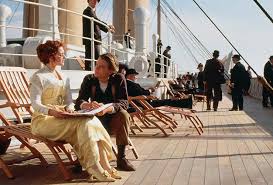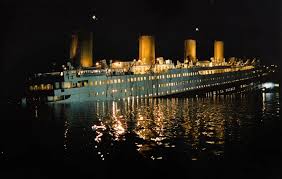🎬 Titanic (1997)

🎬 Titanic (1997)
James Cameron’s Titanic remains one of the most iconic and enduring films in cinematic history. Released in 1997, this epic romance and disaster film not only captivated audiences worldwide but also set numerous records, both in box office performance and critical acclaim. The film’s powerful storytelling, groundbreaking visuals, and unforgettable characters have cemented its place in the annals of film history. While its primary narrative focuses on the ill-fated voyage of the RMS Titanic, Titanic transcends its historical framework to explore universal themes of love, loss, and human resilience.
The film centers around the romance between two young passengers, Jack Dawson (played by Leonardo DiCaprio) and Rose DeWitt Bukater (played by Kate Winslet). Jack is a penniless artist who wins a ticket to board the Titanic, while Rose is a wealthy young woman trapped in a loveless engagement to the controlling Cal Hockley (played by Billy Zane). Their paths cross when Rose, feeling suffocated by her societal obligations, contemplates suicide, but Jack intervenes. As their relationship blossoms, they must confront the social barriers that separate them, all while aboard the doomed ship.
What makes Titanic truly remarkable is its ability to weave a deeply emotional love story within the context of one of the most tragic events in history. The relationship between Jack and Rose is not just the centerpiece of the film, but also the emotional anchor that makes the Titanic disaster so impactful for viewers. Their love story defies class, race, and circumstance, mirroring the way the ship itself was a symbol of human achievement and hubris—destined to be torn apart by fate. The connection between Jack and Rose, played with incredible chemistry by DiCaprio and Winslet, gives the film an emotional depth that resonates with audiences long after the credits roll.
One of the defining features of Titanic is its dedication to historical accuracy. Cameron’s attention to detail in recreating the Titanic and its fateful journey is staggering. From the opulent interior to the grand staircase, every aspect of the ship is painstakingly recreated, allowing the audience to feel as if they are aboard the ill-fated vessel themselves. The film’s production design, which garnered numerous awards, gives a haunting sense of realism to the tragedy that unfolds. Moreover, the visual effects used to recreate the ship’s sinking are groundbreaking for their time, combining practical effects with computer-generated imagery to create an unforgettable sequence that is both harrowing and awe-inspiring.
Beyond the historical disaster, Titanic also explores the human spirit in the face of overwhelming tragedy. As the ship sinks into the icy waters of the Atlantic, the passengers and crew are forced to confront their mortality, and their individual reactions to the impending disaster speak to the varying ways people face death. Some struggle to survive at any cost, while others, like the elderly couple who choose to die together, face their end with grace. These moments of humanity amid chaos add complexity and nuance to the film, making it not just a disaster film, but a profound meditation on life and death.
The performances in Titanic are another standout feature. Leonardo DiCaprio, in the role of Jack, delivers a career-defining performance that transformed him into one of Hollywood’s brightest stars. His portrayal of a free-spirited artist with a zest for life is endearing and relatable, creating a character that the audience cannot help but root for. Kate Winslet, as Rose, is equally compelling, capturing the internal struggle of a woman torn between duty and passion. Their performances elevate the film from being a simple love story to a timeless tragedy that transcends time and space.
The film’s musical score, composed by James Horner, is another key element in its emotional impact. The haunting melody of “My Heart Will Go On,” performed by Celine Dion, became synonymous with Titanic, and the song’s inclusion in the film provides the perfect emotional counterpoint to the sweeping love story. Horner’s orchestral score amplifies the grandeur of the Titanic’s voyage while also underscoring the quiet moments between Jack and Rose, making it one of the most memorable soundtracks in cinematic history. The music enhances the film’s emotional resonance, deepening the audience’s connection to the characters and the story.
In addition to its success with audiences, Titanic received widespread critical acclaim. The film won 11 Academy Awards, including Best Picture, Best Director for James Cameron, and Best Original Song for “My Heart Will Go On.” It also became the highest-grossing film of all time at the time of its release, a title it held for over a decade. The film’s combination of historical drama, romance, and spectacular visual effects made it a cultural phenomenon, and its legacy continues to endure more than two decades later.
As much as Titanic is remembered for its romance and historical accuracy, it is also a study of human nature under extreme duress. The sinking of the Titanic serves as a metaphor for the fragility of life and the unpredictability of fate. Jack and Rose’s relationship, though short-lived, represents the fleeting nature of love, and their journey together serves as a poignant reminder of the importance of seizing the moments we are given. Their story is one of hope, sacrifice, and defiance in the face of tragedy, making Titanic not just a love story, but a universal tale of the human condition.
In conclusion, Titanic remains one of the most influential films in cinematic history. Its blend of romance, historical drama, and disaster film elements has created a timeless masterpiece that continues to captivate audiences worldwide. The film’s unforgettable characters, emotional depth, and stunning visuals make it a film that resonates with people of all ages and backgrounds. With its stellar performances, groundbreaking visual effects, and powerful musical score, Titanic is a film that will never lose its place in the hearts of moviegoers. Its legacy endures, as does the unforgettable love story of Jack and Rose, whose time together may have been brief but whose impact continues to be felt across generations.











